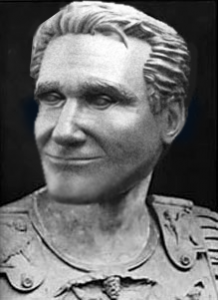Lucius Quinctius Cincinnatus (520 BC – 430 BC) was an aristocrat and political figure of the Roman Republic, serving as consul in 460 BC and Roman dictator in 458 BC and 439 BC.[1]
Cincinnatus was regarded by the Romans, especially the aristocratic patrician class, as one of the heroes of early Rome and as a model of Roman virtue and simplicity. He was a persistent opponent of the plebeians.[2] When his son was convicted and condemned to death, Cincinnatus was forced to live in humble circumstances, working on his own small farm, until an invasion caused him to be called to serve Rome as dictator,……
A group of senators was sent to tell Cincinnatus that he had been nominated dictator. According to Livy, the senators found Cincinnatus while he was plowing on his farm. Cincinnatus cried out “Is everything all right?” They said to Cincinnatus that they hoped “it might turn out well for both him and his country,” and then they asked him to put on his senatorial toga and hear the mandate of the senate. He called to his wife, Racilia, telling her to bring out his toga from their cottage.[4]
When he put on his toga, the senatorial delegation hailed him as dictator, and told him to come to the city. He then crossed the Tiber river in a boat provided by the senate, as his farm was on the far side of the river. When he reached the other side of the Tiber, he was greeted by his three sons and most of the senators. Several lictors were given to him for protection.
Within his lifetime Cincinnatus became a legend to the Romans. Twice granted supreme power, he held onto it for not a day longer than absolutely necessary. The high esteem in which Cincinnatus was held by his compatriots is best illustrated with an anecdote toward the very end of his life. One of his sons was tried for military incompetence. He was defended by none other than the great Capitolinus, who simply asked the jury, if the accused was convicted, who would go to tell the aged Cincinnatus the news. The son was acquitted. The jury couldn’t bring itself to break the old man’s heart.
George Washington was often compared to Cincinnatus for his willingness to give up near-absolute power once the crisis of the American Revolution had passed and victory had been won, and the Society of the Cincinnati is a historical association founded in the aftermath of the American Revolutionary War to preserve the ideals of the military officer’s role in the new American Republic.
